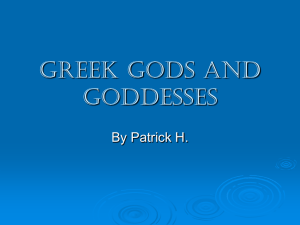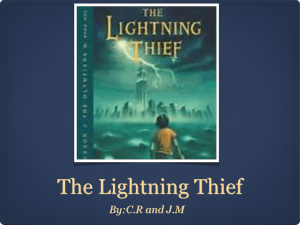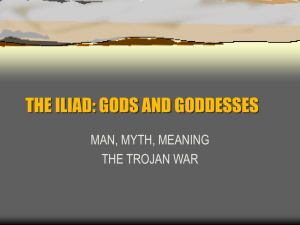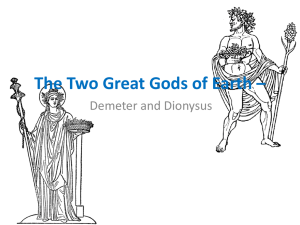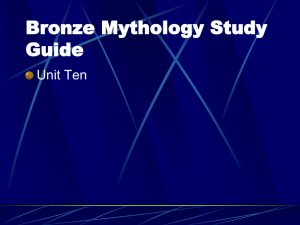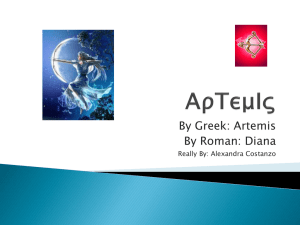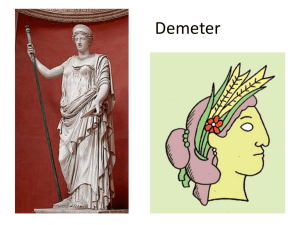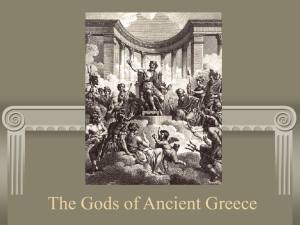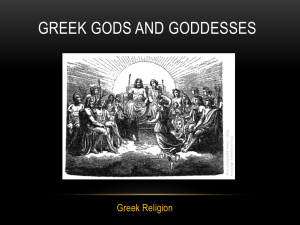比較史特別專題:比較神話學:
advertisement
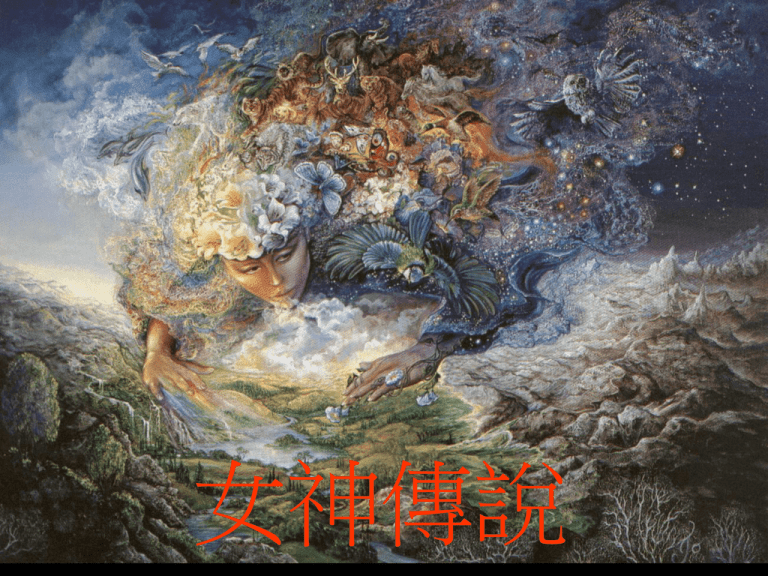
女神傳說 • 從母系到父系社會: • 人類的社會組織,是 從母系社會開始,人 類的祖先崇拜,也是 從女神開始。中國的 女神從女媧、西王母 開始,希臘神話則由 大地之母該亞 “Gaea”(Earth)開 始。 • 從人類社會發展來看, 母系社會先於交系社 會出現存在;所以, 神話的初期,亦有很 多傑出的女神──是世 界神話的共同規律, 也是人類初期社會的 現實生活反映。 比較該亞與女媧: • 希臘女神該亞(Gaea) • 該亞是從混沌(Chaos)所生的第一 位神,是大地之母。她生下天神烏 拉諾斯(Uranus) [sky];並又和 Uranus生下12個Titans巨人 (包括Oceanus, Theia(divine), Mnemosyne(memory), Phoebe(brilliant),及Cronus 等)。後來,Gaea與Uranus被 幼子Cronus推翻;Cronus及所 有巨人又被兒子宙斯(Zeus)所 推翻,宙斯並把所有Titans巨人 趕到地獄去。他們之間又曾大戰。 Uranus和Gaea的這段神話,反 映著人類從野獸界,漸漸成為「原 始群」狀態的生活。最初,人類是 過著茹毛飲血的生活。 • 還經常受到猛獸的侵擾及飢餓 的困擾。原始人類的注意力集 中於維持生命、解決飢餓、及 生育等生物性本能的問題上。 男女之間,只有生理上的要求, 沒有文明社會的道德規限。 • 原始人類最初的「領導人」就 是當時最富有生活經驗的「老 祖母」。就是這樣的一個「老 祖母」。Gaea代表母權制的社 會力量。不過,隨著時代進步 (例如:農業社會的發展), 這種母系制漸漸衰落。 • 希臘神話中的宙斯(Zeus)代表 父權制取代Gaea的母權制; Zeus代表當時新興的社會力量。 • 中國神話中的女媧是參與開天 闢地的女神。天塌下來,女媧 用五色石把天補好。天柱折了, 女媧斷鰲的四足來頂替。洪水 泛濫,女媧殺黑龍除災禍之根。 • 不過,女媧雖然造福人群,但 並不誇耀自己,甚至隱藏自己 的通天本領,讓天地順著自然 的變化規律去發展。根據一些 神話學家所言,女媧可能象徵 中華民族的勤勞、謙虛、及追 求和諧的特性;Gaea的神話 則可能反映希臘民族的活潑、 進取、及富於感情的特點。 中國女神女媧 • 當氏族社會由母權制 過渡到父權制時,女 神的形象,亦從主角 的位置,漸漸退到配 角的位置。人類歷史 上,就是從女王的位 置變成了后、妃的位 置。 • 希臘神話的天后赫 (Hera,Zues的 妻子),中國神話的 嫘祖、嫫母、涂山氏 等,都是這類女神。 • 對Hera的評價,歷史都是貶 多褒少。例如:指她好用權 勢、殘酷無情、嫉妒成性, 尤其是對情敵(丈夫Zeus的 情婦)更是手段毒辣。(大力神 Heracles亦遭她多番陷害, 因他是Zeus與情婦所生的私 生子)。 • 不過,一些神話家指出,這 可能是男性社會對女性、女 神的歪曲、侮辱、迫害?! 據說,Zeus宣佈Hera為天 后以前,Zeus及Hera已同 居了三百年,Hesiod說 Hera是Zeus第七任的妻子。 這反映著人類從「群婚制」 發展到「一夫一妻制」(或 「一夫多妻制」)。 • 中國神話亦是如此。 • ─ 帝俊有常羲與羲和兩個妃子; 黃帝也有四個妃子。據《史記》: 「黃帝居軒轅之丘,而娶於西陵之 女,是為嫘祖。嫘祖為黃帝的『正 妃』,生二子。」。很明顯地,嫘 祖已沒有代表母系社會的女媧或西 王母的地位。嫘祖只是黃帝賢良的 妃子而矣。嫘祖在丈夫黃帝游巡視 的時候,只會默默照顧丈夫的日常 生活,並鞠躬盡瘁地死於路途中。 或者,這就是中國古代社會「男耕 女織」的模式之開始。 • ─ 嫫母則是黃帝其後納之妾妃。 據《雕玉集》卷十四引《黃帝本紀》 說:「嫫母,黃帝時極醜女也:錘 額戚頞,形粗色黑,今之魌頭是其 遺像,但有德,黃帝納之,使訓后 宮。」可見嫫母這位妾妃,只不過 是黃帝的女管家而矣。 • ─ 禹的妻子涂山氏也是如此。《淮南子》:「禹治洪水,通軒 轅山,化為熊,謂涂山氏曰:『欲餉,聞鼓聲乃來』。禹跳石, 誤中鼓,涂山氏往,見禹方作熊,慚而去。至嵩嵩山下,化為石, 方生啟。禹曰:『歸我子!』石破北方而啟生。」可見涂山氏只 不過是為禹這位丈夫煮飯、送飯、生子等事務,而不再像女媧般 參與社會事務。《楚辭.天問》:「閔妃匹合,厥身是繼。胡為 嗜不同味,而快晁飼?」郭沫若《屈原賦今譯》譯作:「相憐相 愛而成配偶,是為生兒育女以延後嗣,為什麼彼此嗜好不同,而 只圖一時安逸?」顯示禹和涂山氏的婚姻只是為了有兒子繼承後 代,並非志趣相投,更不是對涂山氏的憐惜。而涂山氏亦十分害 怕禹的「夫威」:為禹煮飯、送飯、生子;但當她意外地看見禹 化為熊,驚駭而逃,甚至化為石頭人之時,禹大喝:『還我兒 子!』她便乖乖順從地把肚子朝北破裂,生下兒子啟。顯然,涂 山氏雖名為禹之後,其實,也只不過是一位順從男主人的女僕人 而矣?! • 一些神話學家認為中國的女神、女后似乎以賢 淑、服從為天德。希臘的天后Hera則較為活 躍,例如:當Zeus與情婦幽會時,Hera仍威 風凜凜地到處出現,尤其是事後,更追尋 Zeus的情婦及私生子報復。 • 相對而言,中國的女神大致都比較正面,又例 如:助禹治水的瑤姬──她一方面把能驅神役 鬼的書送給禹,還派其他神助禹劈開石頭疏導 洪水,打通阻塞,使河水順流而下。 • 又,例如:炎帝的小女兒精衛女神化身是一隻 小鳥,但她不怕東海之大,曾有「銜西山之木 石,以堙於東海」的念頭──的確了不起!她 以小鳥之驅,想填平東海,從邏輯而論,是可 能的:東海雖大,木石雖小,但若不斷銜木石 去填東海,積小成大,終有一天,東海是會被 精衛女神填平的。 • 另一方面,希臘神話有「紅顏禍水」去描繪女 性的觀念: • 最明顯的例子包括: Pandora(潘多拉)及 Helen of Troy(特洛城的 海倫)等。Helen是Zeus化 作一隻天鵝與斯巴達王后所生 的女兒,被譽為凡間最美麗的 女子。當時很多英雄都追求她。 後來,她嫁給斯巴達王 Menalaus(墨涅拉俄 斯)。……破壞女神──「金 蘋果」(Golden Apple) 愛神Aphrodite(阿芙羅狄 蒂)以Helen酬謝Paris(因 為選Aphrodite為最美麗女 神),令Helen及Paris私奔 往Troy。Helen的一生都是 充滿「紅顏禍水」的感覺。 • 中國神話中,《竹書紀 年》有謂:「桀……曰 妹喜氏。與伊尹交,遂 以覆亡。」中國及希臘 神話常把帝皇戀女色作 為國家衰亡、挑起戰端 的原因。 • 隨著人類社會的演進, 農耕社會的出現,「男 耕女織」漸普遍,終於 男權高於女權: • 據說:雅典人選守 護神(Patron God)時,男公民 都選海神 Poisedon,但女 公民都選Athena; 結果是Athena多 一票而當選。但為 了平息Poisedon 的憤怒(怕他「水 淹雅典城」),從 此,女子再沒有投 票權,孩子的「姓 氏」也從跟母親改 為跟父親。 • • • • • 中國神話亦有從母系神話轉 系父系神話的情況: 改變女神的性格特徵: 始初,《山海經》的西王母 是顯赫的帝王身分,但到: 《穆天子傳》時則轉變為 「帝女」身分,從屬於男神 之下。 改變性別: 中國上古神話中,始祖神多 為女神,例如:夏族的始祖 神為涂山氏,商族的始祖神 簡狄,周族的始祖神為姜嫄, 都是女神。但是,楚族始祖 高陽,屈原說他是顓頊,是 個男子。 • 始祖是要生後代的: • 例如:涂山氏生夏啟,簡狄 生商契,姜嫄生后稷。 • 聞一多《高唐神女傳說之分 析》:「楚之先祖按規矩說, 不是帝顓頊,而是他的妻: 女祿。」本文所謂「高陽氏」 的姓,應該是女祿的姓氏族 名。 • 最初,在母系社會中,是男 子出嫁給女子,以女家的姓 氏為本姓。例如:「后羿」, 據一些神話學家認為可能是 當時女王的男后。 • 總而言之,我們可從中國 及希臘神話中,女神形象、 地位之轉變而探察到當時 人類社會歷史之演變──從 群/雜婚到一夫一妻(多 妻);從女權(系)社會 到男權(系)社會。 • 後記 • 關於中國與希臘神話中, 「生子」的分別: • 隨著父系社會取代母系社 會的演變,女神的生殖角 色在人國曾被男神取代: 《山海經.海內經》: 「鯀腹生禹!」(屈原 《天問》:「伯禹腹鯀」) • 但希臘神話方面,生殖的角 始終由女神擔任: • Gaea是萬物之母,生育的 女神,也是眾神和人類的祖 先。此後,生殖的角色仍由 Gaea的後代繼承:例如 Rhea、Demeter等。 • (希伯萊《舊約聖經》──懷 孕、生子是辛苦的,是對 Eve(夏娃)的處罰?!) Myths on the Goddesses (compiled by Fred Cheung) • [Main sources: Powell, Classical Myth; Evslin, Evslin, & Hoopes, The Greek Gods] The female Olympians (Greek Goddesses) … seem more to be aspects of a single concept: the fecund (productive) forces in life, both natural and human. Thus Demeter is the force that makes grain sprout from seed. Hestia is the life of the house, where the fire burns and sustenance is prepared. Aphrodite is the horrific power of sexual attraction, indifferent to human happiness as it ensures the creation of a new generation. Artemis is the wealth of the wild, where game abounds. Only Athena has no clear relationship with fertility, but she is knowhow in female crafts, especially weaving, in which Greek women spent their lives while no rearing their children. • Demeter, Mistress of Wheat • Whereas Gaea/Mother Earth was the female power who presided over the birth of the world, Demeter was the mother-goddess who oversaw the fruitfulness of agriculture, especially wheat. • Hertia, the Hearth • Hertia was the eldest child of Cronus and Rhea, the first swallowed and the last regurgitated. Her name means “hearth”. She is the Roman Vesta and the most colorless of the Olympians, being nothing more than the fireplace in every house: There was her shrine and her presence, protectress of the home. She defined the internal space of the female world, for it was the duty of the woman in the family to tend the domestic fire. • Aphrodite, goddess of Sexual Love • Aphrodite (later identified with the Roman Venus) embodies the overwhelming power of human sexual attraction; her constant companion was Eros, “love” or “desire” (the Roman Cupid), who emerged from Chaos at the same time as Gaea/Mother Earth and Tartarus, according to Hesiod. (In later myths, however, Eros was the son of Aphrodite by Ares, Hermes, or Zeus). • Artemis, Mistress of Animals • Artemis (Diana, Roman Goddess of hunting)[in ancient times, hunting was a principal source of food]: Homer calls her “mistress of animals”, (in art, showing a woman, sometimes winged, between a pair of wild animals). In origin, Artemis was evidently a mother-goddess, protectress of the young, animal and human, making fecund the whole of nature. • • • Athena, Mistress of the City Athena (whom the Romans called Minerva) is always represented in armor, wearing a helmet, often carrying a spear, and usually holding a shield. Born from Zeus’s head, not from woman’s womb, Athena, always virgin, was a faithful servant of her father and a protectress of male heroes. She watched over Perseus, Heracles, Odysseus, and Jason. In the Iliad she encouraged the Greeks to glorious deeds, assisting them at critical moments in the fray. In Mesopotamia, the widely honored goddess known as Inanna, Ishtar, or Astarte presided over fertility and sexuality. Similar powers were ascribed to the Egyptian goddess Isis. Despite the multitude of names, these goddesses have much in common, representing a religious figure whose cults and myths spread across racial and linguistic lines to exert enormous influence throughout much of the ancient world … (as the Great Mother, or the Great Goddess). • Greek myth differed from that of the ancient Near Eastern cultures not in neglecting the Great Goddess but in dividing her functions rather sharply among a group of goddesses: Artemis controlled the fertility of wild animals, Aphrodite presided over human sexuality, and Hera protected marriage and the family. ….. Demeter, goddess of the grain and the rich harvest. • Observations: The Myth of Demeter and Persephone • The myth of Demeter and Persephone is one of the most perplexing of all Greek myths. In ancient times the story was interpreted as an agricultural allegory, in which Hades was identified with earth and Persephone with grain buried in the earth. Persephone’s return from the underworld was interpreted as the growth of the new wheat crop. • Demeter’s experience more closely exemplifies the reallife experience of Greek mothers, who must give up their daughters to a stranger’s household. In many ways her grief is greater than that of her daughter; in art Persephone is shown consoling Demeter. Nor was the daughter entirely the innocent victim. She voluntarily reached for the flower, even as other women in myth are undone through curiosity about their sexuality. She accepted the pomegranate. Persephone’s curiosity brought division between herself and her mother. • Viewed more broadly, however, Demeter represents the loss that a mother feels for any child, as Greek mother lost so many children to war and disease. Her loss causes her first to grieve and to rage, but eventually, as mother must, she accepts that the world will go on, despite her irreparable sorrow. • The myth of Demeter offers a mythical explanation for the presence of death in the world, explaining why the fertility of the earth cannot be separated from the inevitable presence of death. There can never be a world in which there is only life and never death because life comes out of death, one feeding on the other. Life depends on death. The two Goddesses are a mythic image of the intimacy between the two realms. • Hera • Hera married her brother Zeus –- a family habit. They were always quarreling. Zeus angered Hera by his infidelities; she enraged him with her strategies. She was the queen of intriguers, and always found it easy to outwit Zeus who was busy with many things. • Once, Hera persuaded the other gods into a plot against him. She drugged his drink; they surrounded him as he slept, and bound him with rawhide thongs. He raged and roared and swore to destroy them, but they had stolen his thunderbolt, and he could not break the thongs. But his faithful cousin, the Hundredhanded Briareus, who had helped him against the Titans, was working as his gardener. He heard the quarreling under the palace window, looked in, and saw his master bound to the couch. He reached through with his hundred long arms, and unbound the hundred knots. Zeus jumped from the couch and seized his thunderbolt. The terrified plotters fell to their knees, weeping and pleading. He seized Hera and hung her in the sky, binding her with golden chains. And the others did not dare to rescue her, although her voice was like the wind sobbing. But her weeping kept Zeus awake. In the morning he said he would free Hera if she swore never to rebel again. Hera promised, and Zeus promised to mend his ways, too. But they kept watching each other. Zeus was the king of the gods, lord of the sky. His sister Demeter was the earth-goddess, lady of growing things. His sister Hera was also his wife, queen of the gods. • • Athena Zeus was strolling on Olympus one morning, and noticed a new maiden walking in his garden. She was metis, a Titaness, daughter of one of his old enemies. But the war was long ago, and she was beautiful. He charged down the slope after her. She turned into a hawk and flew away. He turned into a hawk and flew after. She flew over the lake and dived in and became a fish. He became a fish and swam after her. She climbed on the bank, and became a serpent and wriggled away. He changed himself into a serpent, and wriggled after, and caught her. After he left her, he heard a bird cry and a fish leap, and those wild sounds combined to become a prophecy, which the rattling leaves echoed. “Oh, Zeus, Metis will bear a child, a girl child. But if she bears again, it will be a son who will depose you as you deposed Cronos.” The next day Zeus walked in his garden again, and found Metis there. This time she did not flee. He spoke softly to her, and smiled. She came to him. Suddenly, he opened his mouth and swallowed her. That afternoon he suffered a headache --the worst headache that anyone, god or mortal, had suffered since the beginning of time. It was exactly as if someone were inside him with a spear, thrusting at all the soft places in his head. He shouted for Hephaestus, who came rushing up with hammer and wedge. Zeus put his head on the anvil, and Hephaestus split the might skull; then he leaped back, frightened, because out of the head sprang a tall maiden in armor, holding a long spear. • • This was Athena, the grayed-eyed, the wide-browed. The manner of her birth gave her domain over intellectual activities. It was she who taught man how to use tools. She taught him to invent the ax, the plough, the ox-yoke, the wheel, and the sail. She taught women to spin and weave. She concocted the science of numbers and taught it to man. She hated Ares (God of War), and took great pleasure in thwarting him on the field of battle. For all his mighty strength, she often beat him, because she was a mistress of strategy. Before battle, captains prayed to her for tactics. Before trial, judges prayed to her for wisdom. It was she was stated that compassion was the best part of wisdom. ….. All in all, she was perhaps the best-loved god in the Pantheon; the people of Athens named their beautiful city after her. There are many stories about Athena --- about her skill in battle, her wisdom, and her kindness. But, like he other gods, Athena was also very jealous. One of the best stories is that of Arachne. • Arachne was a young girl (princess) who lived in Lydia, famous for her purple dye. Her joy was weaving, and she wove the most beautiful things anyone had ever seen: cloaks so light you could not feel them about your shoulders, but warmer than fur; tapestries wrought with pictures so marvelous that birds would fly through the window and try to eat the cherries off the woven bough. She was a very young girl, and everyone praised her --- and soon she began to praise herself. She said: “I, I am the greatest weaver in all the world. The greatest since the world began, no doubt. In fact, I can weave better than Athena herself.” • Athena heard this, of course. The gods are very quick to hear criticism, and very swift to act. So she came to earth, to the little village where Arachne lived. The girl was inside, spinning. She heard a knock at the door, and opened it. There stood a lady so tall, so sternly beautiful that Arachne knew she must be a goddess, and she was afraid she knew which one. She fell on her knees. Far above her head she heard a voice speaking softly, saying terrible things. “Yes, miserable girl, I am Athena. I am the goddess you have mocked. Is there any reason I should not kill you?” Arachne shook her head, weeping. She could not answer. “Very well,” said Athena. “Prepare yourself for death. You have defied the gods, and must die.” The Arachne stood up and said, “Before I die, great Athena, let me give you a present.” She went in and took a lovely cloak she had woven, and gave it to her. And said, “Take this cloak. It must often get cold up high on Olympus. This will shield you from the wind. Please take it. I am sure you have nothing so fine.” Athena shook her head and said, “Poor child. You are being destroyed by your own worth. Your talent has poisoned you with pride like the sting of a scorpion. So that which makes beauty brings death. But it is a handsome cloak, and I appreciate the gift. I will give you one chance. You have boasted that you can spin and weave better than I … than I, who invented the loom and the spinning wheel, the distaff and the spindle, and out of the fleece of the clouds wove the first counterpane for my father, Zeus, who likes to sleep warm, and dyed it with the color of the sunset. • But you say you can weave better than I. Very well, you shall have a chance to prove it. And your own villagers shall judge. Seven days from today, we shall meet. You will set your spinning wheel in that meadow, and I shall be in my place, and we shall have a contest. You will weave what you will, and I shall do so too. Then we will show what we have done, and the people will judge. If you will, I shall withdraw the punishment. If you lose, it is your life. Do you agree?” “Oh yes, “ said Arachne. “Thank you, dear goddess, for sparing my life.” “It is not yet spared,” said Athena. The word flashed from village to village. When the time came, not only Arachne’s neighbors, but all the people in the land had gathered in the great meadow to watch the contest. Arachne’s house was the last in the village, and faced the great meadow. She had set up her loom outside the door. Athena sat on a low flat hill overlooking the field. Her loom was as large as Arachne’s cottage. The girl went first. … The counterpane was last. When she arose and snapped it out, the people gasped and laughed and wept with joy. And Arachne curtsied toward the low hill, and Athena began to spin. ….. This was too much for the multitude. The vast crowd fell on its knees and wept. Arachne was watching. She had never moved from the time Athena had started to work, but stood there straight with pale face and glittering eyes, watching. And when the people fell on their knees, she turned and went away. She walked quietly to a grove of trees and there took a rope and hanged herself. Athena came down from the hill, and spoke no word to the people, who dispersed. • Then she went to the grove and saw Arachne hanging there. The girl’s face was black, her eyes were bulging, her hair was streaming. Athena reached her long arm and touched the girl on the shoulder. The face grew blacker, and the eyes bulged more. The body shrank; the arms and legs dwindled and multiplied. Then Athena touched the rope. It shriveled, growing thinner and thinner, until it was a frail shining strand. And there at the end of this shining silken hair swung a small hairy creature with many legs. It looked at Athena, then turned and scuttled up its thread, drawing it up as it climbed. It floated away over the grass until it came to a low bush, and cast another loop, and sat there practicing, for it knew that now it was meant to spin without rivalry until the end of time. That is why spiders are called Arachnids by those who know them best. • • • Demeter (& Persephone) Demeter means “Barley-mother.” Another name for her is Ceres, from which we get the word “cereal.” She was the goddess of the cornfield, mistresses of planting and harvesting, lady of growing things. Zeus was very fond of her. He always obliged her with rain when her fields were thirsty. He gave her two children, a boy and a girl. The girl was named Persephone, and Demeter loved her very much. Persephone was raised among flowers and looked like a flower herself. Her body was as plaint as a stem, her skin soft as petals, and she had pansy eyes. She took charge of flowers for her mother. She was adept at making up new kinds and naming them. One day she went farther than usual --- across a stream, through a grove of trees, to a little glade. She carried her paintpot, for she had seen a stand of tall waxy lilies she had decided to stripe. As she was painting their faces, she saw a bush she hadn’t noticed before. She went to look at it. • It was a very strange bush, with thick, green, glossy leaves, and hung with large red berries that trembled on their stems like drop of blood. She stared at the bush. She didn’t know whether she liked it or not. She decided she did not, and seized it by its branches, and pulled. But it was toughly rooted and hard to pull. She was used to getting her way. She set herself and gave a mighty tug. Up came the bush; its long roots dragged out of the ground, leaving a big hole. She tossed the bush aside, and turned to go back to her lilies, but she heard a rumbling sound and turned back. ….. To her horror, the hole seemed to be spreading, opening like a mouth, and the rumbling grew to a jangling, crashing din. Out of the hole leaped six black horses, dragging behind them a golden chariot. In the chariot stood a tall figure in a flowing black cape. On his head was a black crown. She had no time to scream. He reached out his long arm, snatched her into the chariot, and lashed his horses….. Demeter was frantic when girl didn’t come home, and rushed out to search for her. The tall green-clad goddess rode in a light wicker chariot behind a swift white horse, a gift from Poseidon. • She sped here and there, calling, “Persephone … Persephone…” But no one answered….. There she saw the uprooted bush and the trampled grass. She leaped from her chariot. Then she saw something that stabbed her through --- Persephone’s little paintpot, overturned. She lifted her head to the sky and howled like a she-wolf. Then she fell still, and listened. The sun was rising; the birds had begun to gossip. They told each other of the heedless girl, and the strange bush, and the hole, and the chariot, and the black rider, and how surprised the girl was when he caught her. Then Demeter spoke softly, questioning the birds. They told her enough for her to know who had taken her daughter. She put her face in her hands and wept. Just then a little boy came running into the meadow to pick some flowers. When he saw Demeter, he laughed. He had never seen a grownup crying before. But when she looked up, he stopped laughing. She pointed at him, whispering, and he was immediately changed into a lizard. But he hadn’t learned to scuttle yet, and just sat there looking at Demeter a moment too long, for a hawk swooped and caught him. He was a lizard for only a short while. • Demeter climbed back into her chariot and sped to Olympus. She charged into the throne room where Zeus sat….. “Justice! … Your brother Hades has stolen my daughter --- our daughter.” “Peace, good sister,” said Zeus. “Compose yourself. Hades’ courtship has been a trifle abrupt, perhaps, but after all he is my brother --- our brother --- and is accounted a good match. Think, sweet Demeter. It is difficult for our daughter to look beyond the family without marrying far beneath her.” “Never!” cried Demeter. “It must not be! Anyone but Hades! Don’t you realize this is a spring child, a flower child, a delicate unopened bud. No ray of sunlight ever pierce that dank hole he calls his kingdom. She’ll wither and die.” “She is our daughter,” said Zeus. “I fancy she has a talent for survival. Pray, think it over.” • The Demeter noticed that Zeus was holding a new thunderbolt, a marvelously wrought zigzag lance of lightning, volt-blue, radiant with energy. And she realized that Hades, who in his deep realms held all stores of silver and gold, had sent Zeus a special gift. It would be difficult to obtain justice. “Once again,” she said, “will you restore my daughter to me?” “My dear,” said Zeus, “when your rage cools, you will realize that this is a fine match, the very best thing for the child. Please, go back to earth and give yourself a chance to be intelligent about this.” “I will go back to earth,” said Demeter, “and I will not return until you send for me.” Weeks passed. Then Zeus found his sleep being disturbed by sounds of lamentation. He looked down upon the earth, and saw a grievous sight. Nothing grew. The fields were blasted and parched. Trees were stripped of leaves, standing blighted, with the blazing sun beating down. The soil was hard and cracked, covered with the shriveled brown husks of wheat and corn and barley killed in the bud. And there was no green place anywhere. • The people were starving. The cattle had nothing to eat; ….. And a great wailing and lamentation arose as the people lifted their faces to Olympus and prayed for Zeus to help them. “Well,” he thought to himself, fingering his new thunderbolt, “I suppose we shall have to compromise.” He sent for Demeter. When she came, he said, “I have been thinking. Perhaps I have not been quite fair to you.” “No,” said Demeter. “Do you still wish your daughter’s return?” “Yes,” said Demeter. “While she is gone, no crops will grow. No tree will bear, no grass will spring. While she is gone and while I mourn, the earth will grow as dry and shriveled as my heart, and will put forth no green thing.” “Very well,” said Zeus. “In the light of all facts, this is my judgment. Your daughter shall be restored to you, and shall remain with you. However, if any food she passed her lips during her sojourn in Tartarus, then she must remain there. This is the law of abode, older than our decrees, and even I am powerless to revoke it.” “She will have been too sad to eat,” cried Demeter. “No food will have passed her lips. She shall return to me and remain with me. You have spoken, and I hold you to your word.” Zeus whistled, and Hermes, the messenger god, appeared. Zeus sent him with a message to Hades demanding Persephone’s release. • In the meantime, Persephone was in Erebos with the dark king. After the first few days of haste and brutality and strangeness, he began to treat her very gently, and with great kindness. He gave her rubies and diamonds to play jacks with, had dresses spun for her of gold and silver thread, ordered her a throne of the finest ebony, and gave her a crown of black pearls. But she made herself very difficult to please. She tossed her head, stamped her foot, and turned from him. She would not speak to him, and said she would not forgive him. She said she wanted to go home to her mother, and that she had to attend to her flowers, and that she hated him and always would. As she launched these tirades at him, he would stand and listen and frown, and keep listening until she flounced away. The he would go and get her anther gift. • Secretly, though, so secretly that she didn’t even tell it to herself, she was rather enjoying the change. She did miss the sunshine and the flowers, but there was much to amuse her. Secretly she gloated upon her power over this most fearsome monarch. Secretly she enjoyed his gifts and his efforts to please her. ….and marveled at the way he was obeyed. Although she never forgot how he had frightened her when he came charging out of that hole in his chariot, she admired the lofty set of his black-robed figure, the majestic shoulders, the great impatient hand, and his gloomy black eyes….. He tried every way he knew to tempt her into eating. His cook prepared the most delicious meals and his servants bore them to her chamber. • But she would pretend not to notice a thing, and sit holding her head high, not even allowing her nostrils to twitch, although the rich smells were making her wild with hunger. She swore she would not eat a mouthful until he had returned her to her mother. He was desperate to please her. ….. He gave her a little boy to help her garden, a very clever little gardener, a new spirit. He was very deft, and good company, too, although she noticed that his eyes were a bit lidless. She had no way of knowing that he was the same little boy her mother had turned into a lizard and fed to a hawk. But he knew who she was. Standing in the garden one afternoon, …, she saw the little boy eating something. It was a red fruit, and he was eating it juicily. He saw her watching and came toward her smiling, his mouth stained with red juice. He held out his hand. • It was a pomegranate, her favorite fruit. “We’re alone,” he whispered. “No on will see you. No one will know. Quickly now --- eat!” She looked about. It was true. No one could see them. She felt her hands acting by themselves, as though she had nothing to do with them. She watched as the fingers curled savagely and ripped the fruit across. They dug in, plucked out seeds, and offered them to her lips. One … two … three … she thought she had never tasted anything so delicious as these tiny tart juicy seeds. Just as she swallowed the sixth seed, a high glad yelling cry split the air, and the pomegranate dropped to the ground. It was a cry that any god recognized --- Hermes’ keen herald shout, meaning that he was coming with news, good or bad, but worthy of high attention. She raced to the palace. • The little gardener scooped up the pomegranate and raced after her. Sure enough, it was cousin Hermes, ….. “I bring you a message from you mother. She wants you home. And your host has kindly agreed to an early departure. … Haven’t eaten anything here, I hope. No? Good! Let’s be on our way.” He put his arm around her waist, and they rose in the air. And Persephone, looking back, saw the little gardener rush to Hades with the pomegranate in his hand. By the time Persephone had come home to her mother, Hades had already been to Olympus, and had presented his case to Zeus. Zeus pronounced his judgment. Because Persephone had eaten six seeds of the pomegranate she would have to spend six months with Hades each year. “Never mind, Mother,” said Persephone. “Don’t cry. We must be happy for the time that I am here.” “I suffer!” cried Demeter. “I suffer! Here …” She struck herself on the chest. “Here --- in my mother’s heart. And if I suffer, then everyone else shall suffer too. For the months that you spend with that scoundrel, no grass will grow, no flowers blow, no trees will bear. So long as you are below, there will be desolation everywhere.” That is why summer and winter are the way they are. That is why there is a time for planting, and a time when the earth must sleep from frost.
